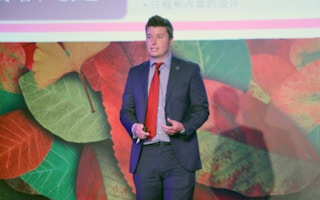Roger Simons is the group sustainability manager for Asia Pacific of MCI Group, a global association, communications and events management company.
He organised the world’s first conference that achieved third party certification under the BS8901 sustainability management system standard in 2008. He sat on the ISO 20121 Standard Project Committee 250, and the Global Reporting Initiative (GRI) Events Sector Advisory Group. His most recent sustainable event project was the United Nations Convention on Biological Diversity at the 11th Conference of Parties (COP11) in Hyderabad, India, which attracted over 11,000 people from 173 countries.
His mission is to further the cause of sustainability within the industry providing education and sustainability-oriented services to progressive clients and their businesses, events or event destinations while also supporting MCI Group’s own ambitious corporate responsibility (CR) programmes across their increasingly expanding network of 48 offices in 23 countries.
Here, he shares with Muriel Boutin-Becuwe his perspective on how events can be managed sustainably and systematically.
What does CSR engagement mean within your domain of work?
I prefer the terminology Corporate Responsibility (CR) as it encompasses a broader view. We are moving towards CR for clients in order to have a wider focus, as events need to have a balanced approach between society and environmental impact while keeping an eye on the bottom line.
The core is to ‘reduce, reuse, and recycle’ as much as possible when MCI organises events. For instance, using recyclable badges, lanyards from sustainable materials, providing recycling bins on site, using mobile platforms versus printed materials, showcasing local organic producers when catering and phasing out certain food items such as beef, which are resource-intensive.
We consistently encourage clients to think differently from the onset of choosing their event destination. The key is to integrate the notion of sustainability at the very beginning of the planning process and make smart choices, working with procurement and the supply chain, reducing impact and then offsetting what cannot be reduced.
What areas should companies focus on to reduce wastage and cost?
Waste in packaging is huge. We need to look at the supply chain and assess if we are completely efficient with resources. This extends from plastic bags to Styrofoam and to materials we use to ship items in.
To what degree do you think should environmental issues be part of the overall business strategy?
Businesses that do not include sustainability in their business strategy will be in big trouble. Sustainability addresses the very issues of whether you’ll be able to continue creating and selling your product in the future and how demand will develop. Sustainability is a strategic approach balancing the environment and society while considering economic factors.
What are the key elements needed to set successful ‘best practices’ in sustainability?
A holistic focus is essential … looking at the various impacts. Can we do more with less? What can be “upcycled”?
Moreover, a critical aspect is metrics and measurements. With our clients we want to show their impact with hard data to better advise them on how to reduce these impacts, and do that in-line with global standards such as the ISO 20121 for sustainable events and GRI reporting guidelines.
How about conducting virtual events? Is this a growing segment?
Business will always and ultimately be conducted face to face. Take political summits as an example. For decisions to be made, you need to have the right people in the same room. Although clients are more and more keen to be acquainted with sophisticated technologies, many meetings just cannot be done via videoconference alone. What we see is an increasing trend for “hybrid meetings” with an online and live component combined.
What are your main CR objectives for the next five years?
Engage and educate clients with global standards such as ISO 20121, for one. The London Olympics is a prime example that a sustainable management system during events can be a solid framework. Second, utilise sophisticated reporting frameworks (e.g. GRI EOSS) for client events. Third, increase sustainability performance objectives and practices in-house with regards to paper, water and electricity consumption. Fourth, be the leader for sustainable events, in subject and in practice. Also, track, measure, and report our impact, providing an example to the rest of the MICE [meetings, incentives, conferences and exhibitions] industry. Last, help Singapore and our Asia Pacific offices pioneer sustainability in our field.
Muriel Boutin of JirikiYOU, has over 16 years of experience in organizational transformation, human resources, and project management linked to People, Sustainability and Corporate Social responsibility.










